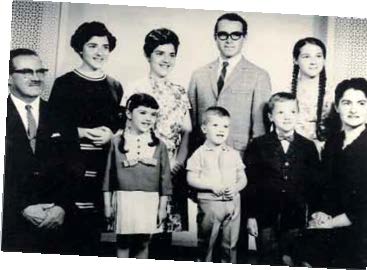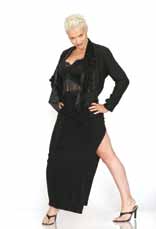
by admin
“Never Tell Anyone”: A Comedienne Breaks Her Family Taboo

Front row: My father, Bernard Sigal, Frances (me), brothers Robert and
Michael, my mother, Liesel. Back row: My sisters Selma and Marilyn, brother Peter, sister Margaret, circa 1966.
I grew up in a picture-postcard-perfect family. My six siblings and I lived in a nice, middle-class, largely Christian neighborhood in Ottawa, Canada. My lovely German mother wore her blue-black hair atop her head in Rita Hayworth-style rolls; my brilliant Viennese father was an eye surgeon with two practices. We went to St. Basil’s Church every Sunday, religiously.
Born in 1961, I was baptized, then confirmed and given first communion. I have four names: Frances Rose Mary Sheridan. All seven of us Sheridan children attended parochial (Catholic) elementary schools.
When I was nine, my father said something about “a Jewish” at our dinner table, and I asked, “What’s a-Jewish?” “It’s not a-Jewish,” he answered. “It’s just Jewish. It’s a religion, a culture.” He paused. “It’s what we were.” He paused again. “What we are.”
The table was silent.
“But many people hate Jews and would happily kill you and all of us!” he continued. “So we are Catholic. That is what you tell people,” he said emphatically. “End of story!”
In an instant, I felt that something was very wrong with us. With me! Why else would people want to murder us if they found out who we really were?
The genie was out of the bottle, and from that day on my father began obsessively spilling out his Holocaust stories. There were stories daily, and at night, too, when post-traumatic stress disorder robbed him of his ability to sleep. Instead of playing or having cozy dreams, my siblings and I heard endlessly about what the Nazis had done to him and his family, and to my mother and her family.
We could always tell when a story was about to erupt because there were prodromal signs. He would start pacing back and forth, smoothing his hair and tugging on his little Sigmund Freud-style beard, gathering his thoughts, remembering. Then he’d talk, and we never interrupted — not with a question, not with our own horror or fear — because his overwhelming need to unburden himself felt like life and death itself. Afterwards, he would look utterly drained, depleted, but also somewhat happy that one, or more, of his children had heard him.
My father had experienced anti-Semitism in Vienna from the time he was a schoolboy, and was regularly beaten by classmates. After the beatings, they would force him to crawl along the gutter until he reached the Jewish ghetto, where he lived. There was one gentile boy that he always mentioned by name, though: Erich Haider.
“Erich Haider often tried to protect me,” he would say.
The day after Hitler took Austria, in 1938, my father returned home to find that his parents, Jocheved and Josef Sigal, were gone. He searched the streets for them for hours, increasingly frantic, until he stumbled upon Erich Haider, his sole gentile ally, but Erich was wearing the arm band of the SS. My father froze in terror: Will even Erich shoot me?
Erich, however, took my father into an alleyway, showed him his name on a death list, and warned him to leave Austria immediately. He told my father that his parents had already been taken away in an SS truck. Wasting no time, my father crawled across the bridge that connected Austria to Switzerland, bullets whizzing inches above his head. He eventually made his way to France where he was rescued by a priest named Pere Goison, who hid him in his seminary. Goison incessantly tried to convince him to convert, my father said, but he refused. He enjoyed telling us his retort: “I don’t change my religion, Pere Goison, as easily as I change my shirt.”
Fast-forward to 1951, my father now married to my mother, and both of them still Orthodox Jews with the last name Sigal. My father was just beginning to establish his medical practice in Morse, Saskatchewan, a small prairie town, when one night a jealous, anti-Semitic doctor and his wife burst into his office, beat him unconscious, smeared anti-Semitic slogans on his waiting-room walls, and left him for dead. The assailants were fined 30 dollars for assault.

Frannie Sheridan
That’s when my parents decided that losing yet another family, this time in North America, was not something they could do. My father forced my very-proudly Jewish mother — whose own mother, Selma Zwienicki, was one of the first Jews to be murdered on Kristallnacht — to convert to Catholicism, relocate, sever ties with all their extended relatives, and Anglicize their name to Sheridan.
From then on the newly-minted Sheridans kept their Fort Knox-level secret. My gut always automatically clenched when my father got to the end of every one of his stories. “Never tell anyone, children, that we were Jewish,” he invariably admonished, “or it will get all of us killed.”
And then, when I was in my thirties, I wrote, and then performed across Canada, an irreverent, feminist, stand-up comedy show with a bit in the middle that touched on the ridiculousness of people pretending to be something they so obviously aren’t — politicians pretending to be human beings, for example. I shared how my Jewish parents had raised me Catholic but were so clearly Jewish. When we attended church, my Dad used to complain all the way through communion [with hunched shoulders, speaking in a Yiddish- European accent], ”I can’t eat this cracker, it’s so dry…needs a shmear of pickled herring… something, a little cream cheese, vat is this?!”
And the critics loved it.
But I had begun struggling with anxiety, depression, terror, shame — all the conditions of inherited P.T.S.D. Although I had comedy big shots around me who believed in my potential, that my career would soar, I descended into a kind of emotional paralysis which was definitively not ordinary stage fright. I would lock myself in my apartment and self-medicate with food and sit in a chair, trying not to move, or feel, or breathe, for stretches of up to 24 hours.
But I was also plagued by an inner voice that insistently urged me, “Tell your story, tell your story, tell your story….” A theater producer, searching for a dramatic solo show to produce, approached me, and I was pulled to move ahead, not with comedy shtick, but with a serious piece that plumbed deep, essential truths.
I ran the idea of transforming my family story into a play by my then-86-year-old father, who had retired and moved back to his native Vienna where he lived as a Catholic. He threatened me with legal action, as did two of my siblings. But there was no choice, as I could no longer sleep through a night.
I called it “The Waltonsteins,” a send-up of the TV sitcom “The Waltons” (about a large, happy, gentile family who lived on a hill, and, well…we weren’t and we didn’t), and when I came onstage for my first performance, I literally froze with autonomic fear, certain that anti-Semites would kill me mid-performance. After several seconds, though, I felt a strange calming presence descend on me, and I knew that it was my grandmother, Selma Zwienicki, the one who had been murdered in her home in Bremen, Germany, on Kristallnacht.
At the end of that first performance, following what felt like endless applause, the audience, transfixed, wouldn’t leave the theater. A journalist reviewed the show in The Jerusalem Report, and extended family members, whom my father had cut off for 44 years, began phoning me from everywhere: Brazil, Silver Spring, Maryland, British Columbia, New York, Montreal…. The reconnection started crucial family healing.
One of my sisters, Marilyn, who hadn’t spoken to me in nine years, came to visit me. Although my father had wanted to protect us, his trauma had instead recreated a war within the confines of our family, dividing his seven children into two acrimonious camps.
During Marilyn’s visit, I happened to retrieve my mail, and there was a letter from my father. “Through your play,” he wrote, “you have given me the courage to reclaim my roots. Yesterday I went to the Jewish Community Center in Vienna and publicly re-declared myself a Jew, which I had never stopped being in my heart.” My father, Bernie Sigal, died on June 29,1999. He is buried in the Jewish section of the Vienna Central Cemetery.
Frannie Sheridan’s award-winning work has aired nationally on NPR, PBS and JLTV. She has written, performed, lectured and taught for over 20 years. Find her at franniesheridan.com.